World Turtle Day was created as a yearly observance to help people celebrate and protect turtles and their habitats across the world. Today, ExeterMarine is celebrating World Turtle Day, by showcasing 8 turtle publications from the last year, from some of our lead academics in the marine science field.
Publication 1 of 8: ‘Plastic pollution and small juvenile marine turtles: a potential evolutionary trap’
Lead author: Dr Emily Duncan
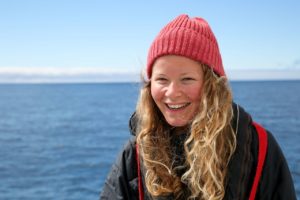 Photography: Eleanor Church
Photography: Eleanor Church
“Plastic pollution could create an “evolutionary trap” for juvenile sea turtles. Stranded turtles (five of the world´s species) found on the east (Pacific) and west (Indian Ocean) coasts of Australia had ingested plastic pieces, mostly hard fragments and fibres. Juvenile turtles travel in currents and develop in the open ocean, but the same currents now accumulate vast quantities of plastic. These turtles show surface and non-selective feeding, therefore are at high risk of ingestion. The next stage of research is to find out if and how plastic ingestion affects the health and survival of these turtles.”
Link to paper:
http://seaturtle.org/library/?v=15583
Publication 2 of 8: ‘Climate Change and Marine Turtles: Recent Advances and Future Directions’
Lead author: Dr Ana Patricio
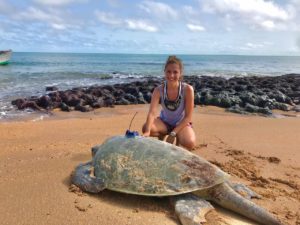
“Climate change can impact sea turtles at all life stages, being one of the major challenges for conservation managers in the near future. For decades, research was focused on the nesting beach, where turtles are more easily accessible, with recent years seeing more studies extending to the marine realm, using novel approaches and technologies. In the latest literature review on this topic, we summarise main findings, highlight knowledge gains and research gaps, and make a list of research priorities for an improved understanding of how climate change may impact marine turtles, to guide future works.”
Link to paper:
http://seaturtle.org/library/?v=14385
Publication 3 of 8: ‘Green Turtles Highlight Connectivity Across a Regional Marine Protected Area Network in West Africa’
Lead author: Dr Ana Patricio
“We investigate the movements of green turtles from the largest Eastern Atlantic population with satellite tracking, to assess the level of protection afforded by the Regional Network of Marine Protected Areas in West Africa. We found that nesting females of this population connect at least five West African nations through their migrations, from Guinea to Mauritania, reinforcing the need of international collaborations for their effective conservation! Turtles stayed mostly within MPAs across the network, underscoring the importance of this sites for this major population. Based on our results we provide recommendations for conservation managers on how they may enhance protection.”
Link to paper:
http://seaturtle.org/library/?v=16094
Publication 4 of 8: ‘Marine turtles of the African east coast: current knowledge and priorities for conservation and research’
Lead author: Casper van de Geer
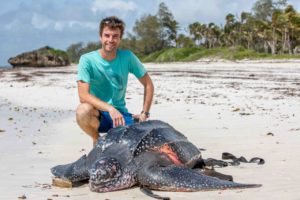
“In this research we worked with a team from across the Western Indian Ocean region to bring together everything that is currently known about turtles along the continental East coast of Africa. Clearly, there is a lot of work left to do, and our findings also highlight the vulnerability of the populations that nest, migrate and forage along the continental coast. Fortunately, there are some great examples of conservation efforts and there is growing recognition of the need to implement effective protection across the region.”
Link to paper:
http://seaturtle.org/library/?v=16138
Publication 5 of 8: ‘Green turtle population recovery at Aldabra Atoll continues after 50 yr of protection’
Lead author: Adam Pritchard
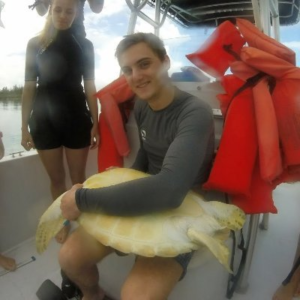
“It’s been an honour to record the inspiring population increase of Aldabra’s green turtles and help deliver a much-needed “good news” conservation message which will hopefully encourage similar programmes. It just goes to show that, given the opportunity, animals have an astonishing capacity to recover from exploitation.”
Link to paper:
http://seaturtle.org/library/?v=16073
Publication 6 of 8: ‘Fulfilling global marine commitments; lessons learned from Gabon’
Lead author: Dr Kristian Metcalfe
Link to paper:
http://seaturtle.org/library/?v=16182
Publication 7 of 8: ‘Investigating differences in population recovery rates of two sympatrically nesting sea turtle species’
Lead author: Dr Lucy Omeyer

“After 30 years of consistent, intensive monitoring of sea turtles in Cyprus, it is great to see such an increase in green turtles. On the other hand, loggerhead turtles are not doing as well, potentially because of incidental bycatch in fisheries in the Mediterranean region. Understanding the threats faced by juveniles will be important for the effective management of these threatened species.”
Link to paper:
http://seaturtle.org/library/?v=16183
Publication 8 of 8: ‘Dietary analysis of two sympatric marine turtle species in the eastern Mediterranean’
Lead author: Josie Palmer
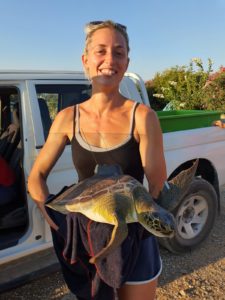
“In this study we investigated diet of stranded and bycaught green and loggerhead turtles in North Cyprus. Green turtle diet was dominated by an invasive seagrass from the Red Sea. In other regions where it has invaded, green turtles still prefer native seagrasses which are rapidly being displaced by the Red Sea invasive leading to concerns over their long-term persistence. This paper documented the highest consumption levels of this invasive seagrass in Mediterranean green turtles to date potentially indicating they are better adjusting. Loggerhead turtles were more opportunistic and carnivorous, placing them at risk to different fishing methods such as baited gears in deeper waters, whereas green turtles forage in shallower water where static set nets are more common. As part of my larger PhD study into the impacts of small-scale fisheries on marine turtle populations in the eastern Mediterranean, these data will be combined with satellite tracking of foraging turtles, fisheries monitoring data and habitat modelling to better inform the level of overlap in habitat use with fisheries and highlight key areas of conflict and opportunities for mitigation.”
Link to paper:
http://seaturtle.org/library/?v=15494
To follow the work of these authors, please see their Twitter handles below:
Dr Emily Duncan – @EmilyDuncan34
Dr Rita Patricio – @arcpatricio
Casper van de Geer – @CasperGeer
Adam Pritchard – @AdamPritchard5
Dr Kristian Metcalfe – @K_METCALFE
Dr Lucy Omeyer – @LucyOmeyer
